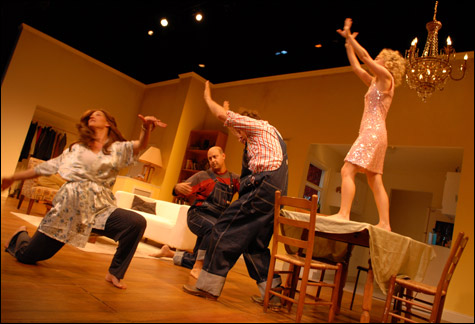
BLAST FROM THE PAST: What to do when “family” come to call? |
Fabuloso is about what happens to a vaguely disappointing marriage when a couple of maniacs show up at the door insisting they’re family. Once the light dawns that this wild ride is in fact a comic metaphor for the bedlam that comes with having children, the play seems both clever and rather sweet. Indeed, playwright John Kolvenbach penned the work, which is in its world premiere on Wellfleet Harbor Actors’ Theater’s Julie Harris stage (through September 6), in the wake of welcoming two sons in 15 months. The play can seem arbitrary, however, particularly as infants do not fight with knives, drink copious amounts of alcohol, or speak.
Here’s the ostensible premise. Kate, who works in a bank, and Teddy, a part-time girls’ soccer coach who considers himself a failure, are home of an evening in their one-bedroom apartment when Ted gets a blast from the past. Arthur, a motherless rich kid taken in by Ted’s family during his teen years but lost track of for two decades (and never mentioned to Kate), calls to say he’s coming over. Teddy, who doesn’t “want him to see me like this,” is thrown into a dither. But it gets to be 3 am, the former faux sibling hasn’t shown, and Kate’s in her underwear. Cue the knock at the door, whereupon Arthur blows in like a hyperkinetic, overemphatic Peter Pan. And he’s followed by a murderous Tinker Bell of a fiancée, against whom Arthur quickly arms Kate and Ted with their own kitchen knives. We will learn that Samantha often threatens Arthur with bodily harm: it’s one of the adorable pair of adult-size children’s favorite games. The immediate source of her ire is her discovery that the family her intended has taken her to meet are made up entirely of hired impostors. Running for his life, Arthur has brought his love to be embraced by the only family he knows: Teddy.

Sunny chaos, alternating with melodramatic chaos, ensues. Arthur and Samantha drink wine and eat Fluff in the host couple’s bed, borrow their clothes, keep them up all night, include them in a carefully choreographed dance routine to a 1920s vaudeville ditty (for which an old-fashioned record player has been ordered in the wee hours), engage in an elaborate game of playing dead, and clearly have no intention of leaving. Arthur’s happiest years were the five he spent playing Spin to Teddy’s Marty, and for him the new arrangement, albeit cramped, is “paradise found.” At first Teddy, too, reverts to childhood, forcing Kate into the role of Ms. Mom. But confidences are exchanged, guns are brandished, and eventually regression leads to rebirth: of Teddy’s flopped ego as well as of his and Kate’s marriage. As for the grown-up rug rats, in their ascots with pajamas and cocktail dresses, they’re both cute and exhausting — like the play.
Kolvenbach is at the helm of the shenanigans, which grow on you as you discern their true meaning. His writing alternates between terse and whimsical, with Teddy given to depressive little ditties that become merrier if still a little cockeyed as the musical bridges that cover the blackouts between abrupt scenes grow increasingly funky. Dustin O’Neill has designed the deliberately plain-Jane set: a white-bread apartment in which the crazily gotten up visitors become the decoration.
It helps that the WHAT actors are appealing, especially Winslow Corbett, whose sprightly yet intense kewpie-doll Samantha is, well, fabuloso. Joseph Fuqua’s hyperbolic grandstander of an Arthur is a whirl of posturing and positive reinforcement. He may be engaged in his boyish way to Samantha, but his heart belongs to Teddy. The scene in which Teddy finally finds the gumption to tell him that he and his mate must vamoose from the Garden is strangely touching, what with Fuqua’s lips a-tremble as he asks to put his head in the parental lap. Elizabeth Atkeson brings a purring, quizzical charm to the mostly sensible Kate. And in the difficult role of Teddy, a hangdog Ramsey Faragallah does what he can to marry zaniness to lack of Zoloft.